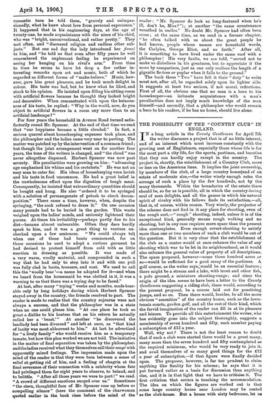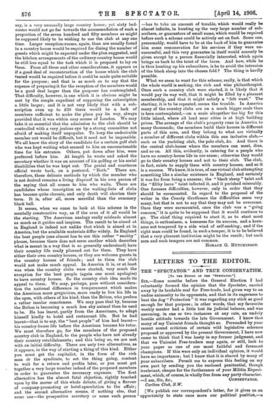THE POSSIBILITY OF THE "COUNTRY CLUB" IN ENGLAND.
IN a long article in the County Gentleman for April 7th the writer discusses a project that is of no little interest, and of an interest which must increase constantly with the growing zest of Englishmen, especially those whose life is for the most part a city life, for the sports, pastimes, and beauties that they can hardly enjoy except in the country. The project is, shortly, the establishment of a Country Club, more or less on the American lines. It implies the joint ownership,. by members of the club, of a large country house/and of an estate of moderate size,—the writer wisely enough rates the acreage of such a place by the few hundreds, not by the many thousands. Within the boundaries of the estate there should be, so far as is possible, all in which the country-loving soul of man delights, and all the games in which his natural spirit of rivalry with his fellows finds its satisfaction,—all, that is, of course, within reason. Very wisely, the projector of the scheme does not find in it any place for shooting, even of, the rough sort,—" rough" shooting, indeed, unless it is of the exceptional kind, generally means rough walking and no shooting, but in any case requires more space than the present idea contemplates. Even enough covert-shooting to satisfy. more than one or two members of such a club would be out of the question. But it is very clear that the establishment of . the club as a centre would at once enhance the value of any shooting which was to be let in its neighbourhood, as it would also enhance the general value of property of all descriptions. The space proposed, however—some three hundred acres or BO—would be sufficient for a good many of the pastimes. A golf course, as the writer says,Iwould be an essential feature ; there might be a stream and a lake, with trout and other fish,. a polo ground, a miniature shooting-range ; and since the origin of the idea seems to have been a letter to the County Gentleman suggesting a riding club, there would, according to the present proposal, be a course laid out for practising jumps, and so on. Then there would, besides, be all the more obvious "amenities" of the country house, such as the lawn- tennis courts, garden golf, and all the rest of their kind, which the fervid imagination of the reader can fill in at its pleasure and leisure. To provide all this entertainment the writer, who has evidently gone into the subject thoroughly, suggests a membership of seven hundred and fifty, each member paying a subscription of £12 a year.
Well, why not ? There is not the least reason to doubt that if such a club were started there would be a great many, many more than the seven hundred and fifty contemplated as the required minimum, who would be very ready to join it, and avail themselves of so many good things for the £12 a year of subscription,—if that figure were finally decided upon. The proposer, however, is far too prudent to claim anything like finality for his scheme ; he says that it is put forward rather as a basis for discussion than anything else, and it is in that light that we have to criticise it. The first criticism that occurs is touching the accommodation. The idea on which the figures are worked out is that some large country house near London may be rented as the club-house. But a house with sixty bedrooms, let us
say, is a very unusually large country house; yet sixty bed- rooms would not go far towards the accommodation of such a proportion of the seven hundred and fifty members as might be supposed likely to be wishing to use the club at any one time. Larger reception-rooms, again, than are usually found in a country house would be required for dining the number of guests which might be expected under the plan suggested, and the kitchen arrangements of the ordinary country house would be still less equal to the task which it is proposed to lay on them. From all these and other considerations, it appears as if a good deal of reconstruction of the house which the club rented would be required before it could be made quite suitable for the purpose; and that is as much as to say that the expense of preparing it for the reception of the members would be a good deal larger than the proposer has contemplated. That difficulty, however, is one which it is obvious might be met by the simple expedient of supposing the subscription a little larger; and it is not very likely that with a sub- scription even up to £20 there would be a lack of members sufficient to make the place pay its way, always provided that it was within easy access of London. We may take it as essential that the admission to the club should be controlled with a very jealous eye by a strong committee not afraid of making itself unpopular. To keep the undesirable member out would be difficult, but it need not be impossible. We all know the story of the candidate for a certain golf club who was kept waiting what seemed to him an unconscionable time for his entrance. Others, put down after him, were preferred before him. At length he wrote and asked the secretary -whether it was on account of his golfing or his social disabilities that he was kept out. The genial and courteous official wrote back, on a postcard, "Both." There are, therefore, these delicate methods by which the member who is not desired remains a living disproof in his own person of the saying that all comes to him who waits. There are candidates whose inscription on the waiting-lists of clubs has become quite chronic, and only death will shorten their term. It is, after all, more merciful than the summary black ball.
It seems, when we come to look at this scheme in the mentally constructive way, as if the crux of it all would be the starting. The American analogy really misleads almost as much as it guides and inspires. The result to be aimed at in England is indeed not unlike that which is aimed at in America, but the available materials differ widely. In England the best people (one almost has to use this rather "snobby" phrase, because there does not seem another which describes what is meant in a way that is so generally understood) have their country life ready planned out for them. They have either their own country houses, or they are welcome guests in the country houses of friends ; and to them the club would not make much appeal. In America it is, or at least was when the country clubs were started, very much the exception for the best people (again one must apologise) to have country houses. So the country club idea made its appeal to them. We may, perhaps, pass without considera- tion the national difference in temperament which makes the American more gregarious, more ready to live his life in the open, with others of his kind, than the Briton, who prefers a rather insular remoteness. We may pass that by, because the Briton is becoming a much less shy animal than he used to be. He has learnt, partly from the Americans, to adapt himself kindly to hotel and restaurant life. But he had learnt—that is to say, the "best people" of him had learnt— his country-house life before the American became his tutor. We must therefore go, for the members of the proposed country club in England, to the people who have not already their country establishments; and this being so, we are met with an initial difficulty. There are only two alternatives, as it appears, in the way of starting a thing of this kind. Either you must get the capitalist, in the form of the rich man 6r the syndicate, to set the thing going, content to wait for a return and profits later, or you must get together a very large number indeed of the proposed members in order to guarantee the necessary expenses. The first alternative has the almost fatal objection, rightly touched upon by the mover of this whole debate, of giving a flavour of company-promoting or hotel-speculation to the affair; and the second alternative means, if nothing else, that some one—the prospective secretary or some such person
—has to take an amount of trouble, which would really be almost infinite, in hunting up the very large number of sub- scribers, or guarantors of small sums, which would be required before such a scheme could be actively set on foot. Some one, presumably, would have to be at the back of him to guarantee him some remuneration for his services if they were un- successful, and this very guarantee in itself would scarcely be given except by a person financially interested, which again brings us back to the taint of the lucre. And how, while he is thus hunting up his subscribers, is he to avoid the intrusion Of the black sheep into the chosen fold ? The thing is hardly possible.
What we seem to want for this scheme, really, is that which the whole world is seeking, the rich and wise philanthropist. Once such a country club were started, it is likely that it would pay its way well, that it might be filled by a pleasant membership, and that it might satisfy a "felt want." The starting, it is to be repeated, seems the trouble. In America many of the country clubs are on a much bigger scale than is here contemplated,—on a scale altogether too big for this little island, where all land near cities is at high building prices. The acreage of the club's property runs in America to many thousands; the members build their houses in different parts of this area, and they belong to what are virtually a number of different clubs within this one inclusive club,— such as the yachting club, the polo club, &c. And there is the central club-house where the members can meet, dine, and so on. All this, evidently, is catering for a people who have no country-house life in our sense; otherwise they would go to their country houses and not to their club. The club, in fact, exists to supply them with country houses, and so it is a success. We know, it is true, of one virtual club attempting something like a similar existence in England, and certainly it was far from being a success; the "black sheep" taint and the "filthy lucre" taint infected it, and it perished miserably. One foresees difficulties, however, only in order that they should be surmounted. In regard to the proposal of the writer in the County Gentleman the difficulties seem very many, but that is not to say that they may not be overcome. Once they were surmounted, once the club was a "going concern," it is quite to be supposed that it would continue to go. The chief thing required to start it, as to start most things, is enthusiasm, a keenness for its success, and a keen- ness not tempered by a side wind of self-seeking; and if the right man could be found, in such a temper, it is to be believed that a very pleasant institution might be the result; but such men and such tempers are not common.
HORACE G. HUTCHINSON.







































 Previous page
Previous page